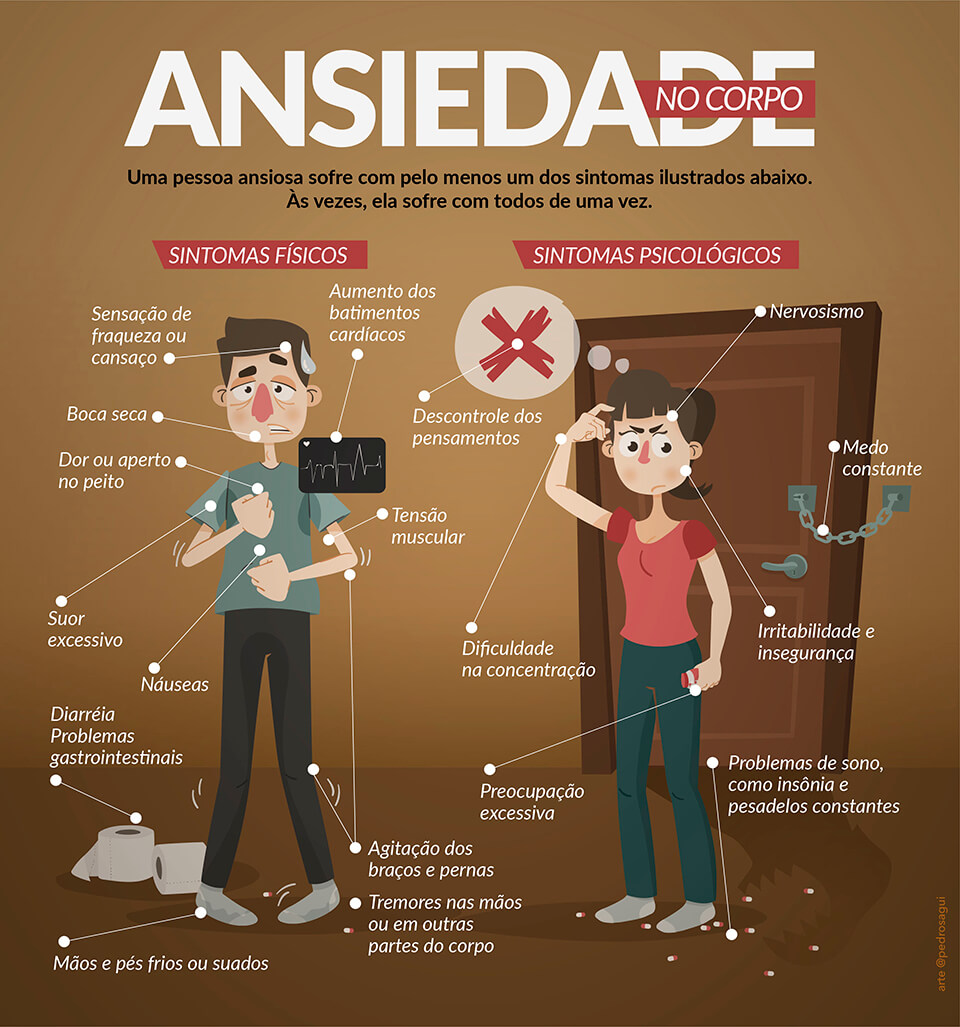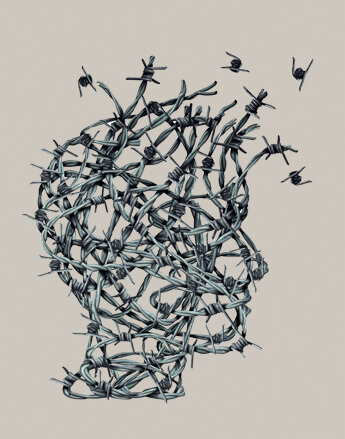According to the World Health Organization (WHO), Brazil is the most anxious country in the world. In 2015, 18.6 million Brazilians suffered from some anxiety disorder. It is a mistake to think that this disease affects only the most vulnerable. The numbers and science itself prove that anxiety affects people of all ages, social classes, and different intellectual levels.
Mental disorders also affect the world economy. Each year, there is a $1 trillion economic loss in public and private safes due to anxiety.
But why is anxiety considered a disease? After all, everyone has anxiety levels that doctors consider “normal”. Some people get so anxious that they even get flu symptoms like fever, sore throat or headaches. Now that is truly a serious sign of major anxiety in the body.
Disease, in the essence of the term, is everything that causes biological change in health conditions. That is, the pressures and daily routine turn anxiety into a disease that can incapacitate the individual to perform simple activities such as sleep. Anxious people feel their emotions much more than others do. In fact, they usually go to the doctor five times more often.
Just to get a sense of how serious is the disease, Social Security pointed out that mental disorders are the third reason for work leave in Brazil. The INSS (National Institute of Social Security) pays about R$ 200 million each year in benefits only for the victims of these disorders.
In the Brazilian territory, there are many factors that contribute to the number of anxious people, such as unemployment, poverty, environmental and genetic factors and especially the unhealthy lifestyle. In this case, it is worth remembering that stress is also linked to anxiety and depression.
Anxiety also has to do with genetics and education. Recent studies by Turku University in Finland show that the more anxious parents are, the more likely their children are to suffer from the disease. To get an idea, 65% of children living with anxious parents have anxiety symptoms. If the behavior persists until teenage hood, they are 20 times more likely to develop eating disorders such as bulimia and anorexia.
The Duke University in the United States pointed out that people with a family history of depression, anxiety, and substance abuse may have anxiety.
In addition, the disease is very present in the lives of business people and college students. These two audiences, for example, are more vulnerable to the disorder because they are involved in more stressful and unusual situations.

Expert Interview
How can anxiety cause an impact in people’s lives?
IM: It can cause that in many different ways. Starting with the mood that suffers constant swings. An anxious person eats a lot or eats much less, that is, there is a possibility of triggering an eating disorder. In fact, most anxious people tend to get rid of tensions over food and consequently become obese. Anxiety takes away sleep, peace of mind and the tranquility of the day. Usually, an anxious person looks at their cell phone every ten minutes, because they are waiting for a simple message to respond. If they have some new idea before falling asleep, they are very likely to have insomnia about it.
Another problem is the feeling of insecurity in social relationships and especially in love relationships. Partners should also be understanding with people who have the disease.
ANXIETY vs. DEPRESSION
Brazil is the fifth country in the world with the most depressed population, with 5.8% of victims. The disease affects about 322 million people worldwide, according to WHO. That number has increased by 18% over the last ten years and is growing more and more.
Women are the majority in the world when it comes to depression, with 5.1% victims, while men add up to 3.6%. Half of those suffering from depression live in Asia.
Anxiety and depression go hand in hand, like inseparable friends. In many cases, a single patient may suffer from both diseases at the same time.
Going deeper into this issue, experts consider severe attitudes related to depression, such as suicide, for example.
About 800,000 people commit suicide every year. There are many motivations that lead to this act, but experts agree that the causes are unanimous: anxiety, stress and depression.
Anxiety is well related to obesity. Some people tend to throw all their frustrations on food. This could be disastrous in the long run. Watch the next video and learn what can happen:
How can you identify anxiety disorder?
IM: Anxiety causes fear, insecurity, impatience, agony, and emotional and mental paralysis, which can affect everyday activities. In addition, those who suffer with the disease don’t concentrate easily, they suffer from insomnia and they worry too much about simple things. The symptoms are numerous. This is a normal emotion, especially when we have a problem, when we need to make a decision or when we are going on a very special trip. The key to finding out if you are severely suffering from anxiety is to pay attention to the details and what people around you talk about you. Some people don’t go to therapy often, but having a good conversation with a mental health specialist can help you understand whether or not there is anxiety. The worst part of this disease is that it works quietly, which means that many people more might be suffering because of that and completely unaware of it.
Generalized Anxiety Disorder (GAD): This disorder occurs when anxiety persists for a long time and interferes with daily activities. The main symptom is excessive worry or constant restlessness.
Panic Syndrome: This is an anxiety disorder in which there are unexpected crises of despair and intense fear that something bad will happen, even if there is no reason for it. The possibility of panic attacks happening causes loss of control and fear of going crazy or having a heart attack.
Social Phobia: This disorder causes extreme discomfort and dread in social situations such as new surroundings, parties, public performances, and others. The individual feels unwell, heart palpitations, excessive sweating, body agitation and fear.
Specific Phobias: These are irrational and specific fears of a particular object, animal, activity, or situation. Phobias do not present logic for its development; it usually is something that presents no real danger. There are some common types such as claustrophobia, arachnophobia, agoraphobia (fear of being alone in public places), acrophobia (fear of heights), aichmophobia (fear of needles), katsaridaphobia (fear of cockroaches) and coulrophobia (fear of clowns).
Obsessive Compulsive Disorder (OCD): This is a psychiatric anxiety disorder. The individual has recurrent crises of obsessive, intrusive thoughts, and very repetitive, compulsive behaviors, such as washing their hands every one hour, for example.
Posttraumatic Stress Disorder: This disorder is marked by various physical, psychic and emotional symptoms. Usually occurs when the person witnessed scenes of violence or was the victim of aggression. The memory of trauma is what causes mental and neurophysiological imbalance.
Quiz
Do you consider yourself an anxious person?
When you’re traveling, how do you feel the day before?
Do you often feel “butterflies in your stomach” or heart racing when facing new situations?
Do you usually take longer to fall asleep because of night thoughts?
Do you usually bite your nails or repeatedly move your leg or foot a lot?
Do you think your work causes stress and anxiety?
You are on the fine line between the two extremes of anxiety. It is not precisely balance, but it does mean that you can control the main stress and anxiety situations in your life. Keep betting on balance and channel your anxieties into sports or hobbies. Another thing that might help you is the Bible. The book talks about big events that make people even more anxious. Knowing how to deal with it is important to have an easier life. Learn more.
Calm down! You are too anxious. You must understand that you cannot control all things. By the way, it’s time to seek help from an expert, isn’t it? Therapy, hobbies, or physical activity can help you find balance. Try disconnecting a little from the hustle and bustle of everyday life. How about staying a little away from your phone?
Another thing that can help you is the Bible. The book talks about big events that make people even more anxious. Knowing how to deal with it is important to have an easier life. Learn more.
The world could fall apart and you’d still be at peace, right? Congratulations, but it also has a downside, as sometimes you give off an impression of too quiet or loss of interest. Always remember that balance is the perfect place for you to be. The Bible also talks about anxiety. The book talks about big events that make people even more anxious. Knowing how to deal with it is important to have an easier life. Learn more.
How can we find the cure to anxiety?
IM: I find it difficult to cure anxiety forever because, as I have already discussed, anxiety is a natural emotion of the human being. I believe it is possible to control and thus live with it in a healthy way. Now, in order to control it, there are a number of techniques such as: practicing physical activities and sports; maintain hobbies involving art, music and gastronomy; as well as good old therapy and, for extreme cases, remedies prescribed by experts. Most importantly, the individual must learn to control their emotions. Thinking, breathing, and trying to find the way to calmness is an individual journey that requires maturity to understand that we cannot control everything.
Citrus fruits: Vitamin C, which is found in citrus fruits, decreases the secretion of cortisol, a hormone released by the body in stressful situations.
Healthy Carbohydrates: The nutrients in this group raise your blood sugar, giving you energy, making you feel good and in and have energy.
Banana: The fruit is rich in tryptophan, which aids in the production of serotonin.
Fish: They are an excellent source of tryptophan, which together with vitamin B3 and magnesium produce a lot of serotonin. It also contains taurine, which the body uses to physiologically control anxiety.
Chocolate: It is rich in flavonoids, an antioxidant that helps in the production of serotonin. But don’t overdo it, because food can make you fat.
Spinach: Contains folic acid, which is a natural antidepressant vitamin. When the body is lacking in folic acid, it also lowers serotonin levels.
Sometimes, it seems that the world is about to end, except it won’t… The human mind has the great ability to control the body, but cannot foresee the future or change the past. To understand and accept that is a big step into having a better life.
Anxiety is not just a modern age disease. Many people have been anxious, as if expecting a big event. Even experts, self-help books, and the Bible itself report this fact. Learn more.

